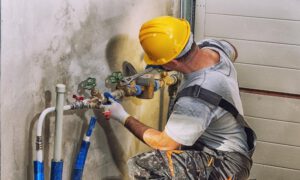Plumbers Spring TX install and repair systems that transport water, gas, and waste. They also collaborate with other professionals, such as architects and construction teams, to ensure that plumbing systems are integrated seamlessly into building projects.
If you are interested in becoming a plumber, consider starting out with a vocational school program or an apprenticeship. This will allow you to earn money while you learn the trade.
Plumbers are responsible for the installation, maintenance, and repair of plumbing systems. They work with water and gas pipes to ensure that water is available and that waste is removed efficiently. They also install and repair fixtures such as bathtubs, toilets, sinks, and water heaters. They also maintain septic systems and drain lines. Many cities require that plumbers have a license to work in the field. In addition, some plumbers specialize in specific types of plumbing systems. For example, master plumbers often work with complex piping systems in high-rise buildings. These professionals must be able to discreetly run pipework through multi-story structures while meeting local plumbing codes.
In addition to these physical demands, plumbers must have good interpersonal skills. They must be able to listen to customers’ complaints and figure out how to resolve them. They must also be able to read and interpret blueprints. A good plumber is also a critical thinker and must be able to weigh different solutions. In some cases, they may need to collaborate with other professionals, such as electricians and construction teams.
Most plumbers have full-time jobs and are on call during the evenings and weekends. They may also need to work on holidays. Some plumbers work for large companies and have set schedules, while others are self-employed. In both cases, these workers must be able to work in tight spaces and travel between jobs.
Plumbers work primarily in residential homes and commercial buildings. They may also work in factories or power plants. Some plumbers specialize in service and repair work, while others focus on new construction or large-scale projects. Some are certified to work on gas and water heating systems.
Plumbers typically start their careers by earning an apprenticeship with a union or non-union training program. The program includes on-the-job training, technical instruction, and exams. After completing an apprenticeship, plumbers can apply to take the Interprovincial Exam and become certified journeypeople. Some plumbers choose to pursue other certifications to demonstrate their competence to employers and clients. Certifications such as National Inspection Testing and Certification and the International Association of Plumbing and Mechanical Officials are not required but can increase a plumber’s marketability.
Education and training requirements
In order to become a plumber, you will need to have certain qualifications. These include a high school diploma or GED certificate and an apprenticeship or training program that will teach you the skills of the trade. In addition, most states require that you obtain a license. There are many different ways to get the training you need, such as through a formal apprenticeship, a vocational school, or an online program. Many colleges offer courses that can help you become a plumber. For example, the SUNY college system offers several Associate of Applied Science degrees related to plumbing.
The first step is to get your high school diploma or GED certificate. This is important because it will give you a foundation for the math and science you need to succeed in the field. It is also necessary for the next step, which is to enroll in a vocational school that offers a program in plumbing. You will want to choose a program that will be both practical and comprehensive, with hands-on labs and classroom instruction. Ideally, you should choose a program that will prepare you to pass the state certification exam.
Most plumbers receive their education through a formal apprenticeship program, which typically lasts five years. This includes both classroom instruction and paid on-the-job training. These programs are sponsored by unions and employers and can be found in most states. In New York, there are many apprenticeship opportunities through local United Association unions. The apprenticeship program will teach you the basics of plumbing, including safety, drafting, and blueprint reading, as well as the intricacies of local codes and regulations.
In addition to education and training, it is essential for a plumber to have good communication skills. This is because the plumbing industry can be stressful, and it is important to communicate with customers in a friendly and professional manner. It is also helpful to be able to listen to customer complaints and determine the cause of the problem. Other soft skills that are needed for this job include manual dexterity, coordination, and analytical thinking.
Work environment
The work environment for a plumber varies depending on the type of plumbing project they’re working on. Typically, plumbers work on pipes that transport water and waste in homes and commercial buildings. They also install and repair plumbing fixtures, such as toilets, sinks, showers, and baths. They may also install appliances that have water line connections, such as washing machines and fridges.
Plumbers must be able to work in tight spaces and on complicated plumbing projects for long periods of time. They also need to be able to handle heavy tools and large amounts of material. Many plumbers have to be on call for emergency services, so they must be able to handle unexpected work requests.
Typical workplaces for plumbers include residential and commercial buildings, industrial sites, and construction sites. In residential settings, plumbers often work directly in people’s homes and apartments. They may also work in confined spaces, such as crawl spaces or basements. They interact with clients frequently and may need to explain technical information about their plumbing system. Plumbers often have to follow specific safety guidelines when working in these environments.
Plumbers who specialize in green or sustainable plumbing practices work in a different kind of environment. They often collaborate with other professionals, such as electricians, to ensure their systems work well together and meet all relevant standards and codes. In addition, they might need to educate their clients about how to use environmentally friendly fixtures and appliances.
Many plumbers work independently or for smaller companies that specialize in a certain area of plumbing. Others work for large companies that offer a variety of plumbing services. They must be able to work in multiple locations and shifts, and they may need to travel between jobs.
Plumbers who are self-employed or who own their own business have more control over their schedule and can choose the hours they want to work. They usually need to be on call at night or on weekends to respond to emergencies. They must also be able to complete their work quickly and efficiently. Plumbers also need to be able to communicate clearly with their customers and other workers.
Salary
Plumbers are skilled construction workers who install, maintain, and repair pipes that supply water or other liquids and gases to homes, businesses, and industry. They also identify and repair plumbing problems, such as leaks or clogged drains. They are typically trained at a vocational school or through an apprenticeship, and many work for unions.
The average salary for a plumber varies by location, experience, and employer. Some states offer higher wages than others, but it’s important to consider the cost of living when choosing a location. In addition to salaries, plumbers often earn tips and bonuses. These bonuses can add up quickly and significantly to a plumber’s overall income.
Most plumbers work in residential settings, but some also work for commercial and industrial clients. These jobs require more specialized skills and may involve working in cramped spaces. In addition, plumbers must know local city codes to ensure that their work complies with inspection requirements. Some plumbers are self-employed, while others work for larger companies that employ them as journeymen or apprentices.
A successful plumber is a patient individual with a practical mind and manual dexterity. He or she must be able to troubleshoot and solve problems quickly. Plumbers are also required to have stamina as they perform physically demanding labor and may need to crawl in tight spaces or attics. They also interact with customers on a daily basis and must be friendly and courteous.
Entry-level plumbers generally earn between $33,500 and $113,500 per year, depending on their state, education, skills, and employer. Some plumbers also receive overtime and other benefits.
A plumber’s job is crucial to our daily lives, and without plumbers, we would be unable to have clean water or drainage systems. These professionals are in high demand, and the salaries they earn reflect that fact. The good news is that they can make a decent living while enjoying flexible hours and a great career path. Many plumbers also join a union, which can improve their career prospects even more. Some of these unions even have scholarships available for students who want to enter the plumbing field.

